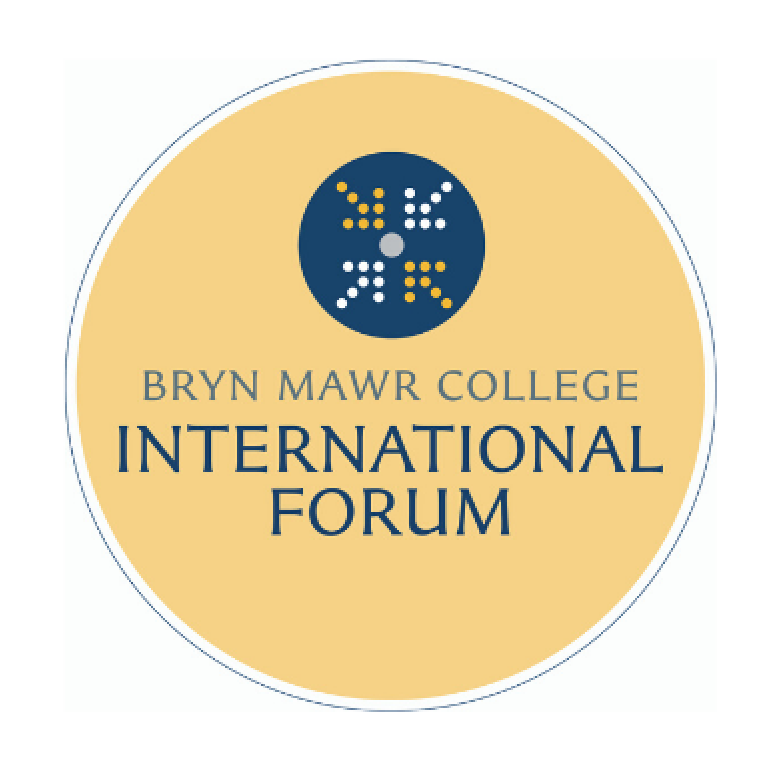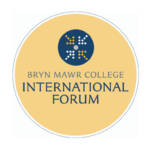Scroll down to review and comment on breakout discussion themes.
More than 300 alumnae/i, parents and friends of Bryn Mawr College from 37 countries registered to be part of the inaugural International Forum!
The 2021 event was reimagined in a virtual format, after the original 2020 in-person event planned for London was canceled due to the global pandemic. Attendees joined the live events from a multitude of time zones around the world.

Alumnae/i from the classes of 1952 through 2020 joined President Kim Cassidy and her guests for “fireside chat” conversations about leadership and innovation, followed by intimate breakout discussions in small groups. In Session I on March 9th, President Cassidy was joined by Rt. Hon. Baroness Lindsay Northover, MA’78, PhD’81, the Liberal Democrats’ House of Lords spokesperson on Foreign Affairs. In Session II on March 11th, she welcomed Amy Hsu ’94 (Trustee), Global CEO of RSI.
Forum Convener Eleanor “Tabi” Haller-Jorden ’81, President and CEO of The Paradigm Forum GmbH (TPF), framed and synthesized the conversations, and joined attendees in small group discussions that drew connections among the themes through the lens of the liberal arts – examining both the enduring value of this educational model in today’s global society, and the challenges facing it during the COVID-19 pandemic and beyond.
Tabi also offered personal perspective on her own involvement with the College, and highlighted ways for alumnae/i and parents to continue or renew their engagement with Bryn Mawr, its students and alumnae/i around the world.
Please visit our stay connected page for specific opportunities to get involved, and for exclusive Forum content!
Breakout Discussion Themes
Upon conclusion of the fireside chats, attendees joined breakout rooms with Mawrters from around the world to discuss questions aligned with the Forum’s topics of innovation and leadership through the lens of the liberal arts model.
The following themes emerged from the breakout groups, and we encourage you to continue to the conversation here and within your own personal and professional communities!
- The liberal arts model is unique on the global stage and has real value.
- In many countries outside the US, higher education is publicly funded and families do not pay tuition. However, there is pressure to specialize and less freedom to explore ideas and individual paths.
- This pressure to specialize in a narrower course of study makes a liberal arts education abroad worth paying for, albeit at a considerable sum relative to tuition-free education in one’s home country.
- Because the model is not found commonly outside the US, it can be challenging to articulate the value of the liberal arts to employers elsewhere who are not familiar with it.
- We need to be “ambassadors” for the liberal arts, Bryn Mawr and its students.
- There is a pressing need for critical thinkers and cross-cultural and multi-disciplinary understanding to address the world’s complex problems and develop a broader world view.
- This was evidenced in how the world grappled with the covid-19 pandemic, which needed to be addressed from a comprehensive not just pathological perspective.
- The liberal arts develops the whole person and prepares you to remain flexible, nimble and resilient. Being able to change and move is what builds a career.
- The liberal arts model takes you out of your comfort zone, and creativity comes from this.
- The Honor Code distinguishes the scholarship and work ethic of Bryn Mawr grads around the world.
- There is a pressing need for critical thinkers and cross-cultural and multi-disciplinary understanding to address the world’s complex problems and develop a broader world view.
- The liberal arts prepares you to advocate for justice and develops a sense of interconnectedness, which is critical in today’s global society.
- Not being wedded to any hierarchy positions liberal arts graduates well to critically examine systems and advocate for change.
- Bryn Mawr builds confidence to speak up even when your opinion may be unpopular, and to help elevate other women.
- The pandemic has had enormous social, economic and political implications particularly for women, and the liberal arts builds our sense of connectedness within society. The ability to be sensitive to and aware of that connectedness is critical, especially now.
- Residential colleges bring people together in community from diverse backgrounds, and thus become ideal testing grounds for how new ideas or methods will work in the broader society.
- Residential colleges create conditions in which students must challenge their own assumptions, building experts by living and communicating with a variety of different individuals, making it a pivotal time in preparing you for your future post-graduate life. It bears similarities to a good pilot project, in testing how something will work in larger communities/the real world.


admin
We invite you to contribute to the Forum conversation and to reflect on personal examples from your own experience that further or deepen the themes above.
Below, we’ve shared a version of the “meeting agreements” that framed our live break-out discussions, and we will abide by these here in the online version.
In this discussion, we agree to:
• Welcome and respect all voices.
• Recognize that participants are coming to this discussion from different perspectives and cultures.
• Listen with openness.
• Take space and make space – by sharing your concise perspective and allowing room for others to offer theirs as well.